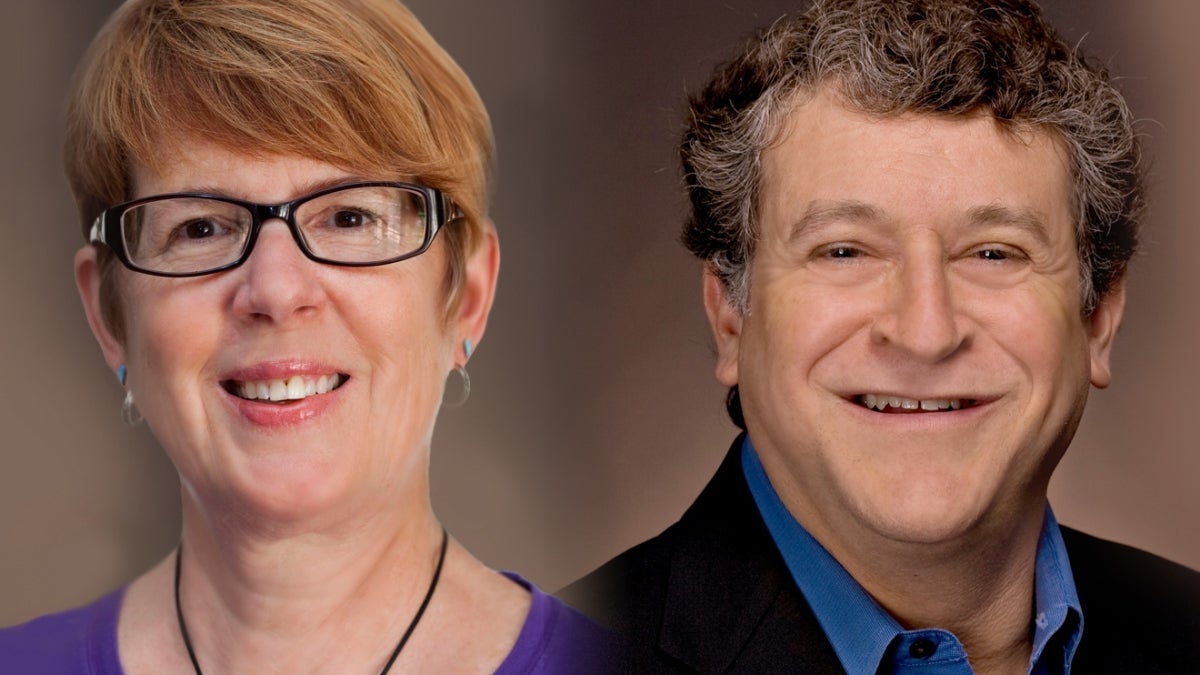Professors named outstanding doctoral mentors

“Disciplined play” and inclusive support groups are two of the keys to successful mentoring, say two Arizona State University professors.
Steven L. Neuberg, Foundation Professor of Psychology, and Elizabeth (Beth) Blue Swadener, professor of justice and social inquiry in the School of Social Transformation, have been named Outstanding Doctoral Mentors of 2012 by ASU’s Graduate College.
Former and current students praise these two mentors for their personal warmth and wisdom and generosity with their time and support, as well as their ability to work with diverse students who differ in ethnicity, culture, gender, religion and socioeconomic status.
“The Outstanding Mentor Award provides an extraordinary opportunity for ASU to honor our finest doctoral mentors,” says Maria T. Allison, executive vice provost for Academic Affairs and dean of the Graduate College. “These individuals have demonstrated, as revealed in the nomination letters submitted by their deans, directors and former doctoral students, an extraordinary ability to inspire the professional and personal lives of their students.”
The recipients of numerous awards and honors, these two mentors maintain a daunting schedule that includes teaching, research, writing and co-writing over 50 funded grants, and numerous professional memberships and service organizations.
Steven L. Neuberg, Department of Psychology (Social), College of Liberal Arts and Sciences
As a social psychologist and leading expert in social cognition, Steven Neuberg’s research interests include prejudice and discrimination, religion and conflict, and stereotyping.
His mentoring philosophy includes “disciplined play” as a form of creativity that pushes against existing boundaries and generates innovative ideas. “I want my doctoral students to take risks with their ideas,” says Neuberg. Although it’s critical for them to also learn foundational facts, theories and methodological skills, he says, “together, our willingness to take risks with ideas creates an exciting and adventurous intellectual environment – a playground for discovery.”
Excitement about new ideas and a genuine curiosity are two of Neuberg’s most memorable traits, writes his former student Dylan Smith, now an associate professor of preventive medicine at Stonybrook University. “Steve was fascinated – rather than dismayed – at disconfirming evidence, always sure that the data would lead us in interesting directions.”
“Steve Neuberg is among our most popular graduate mentors, and the quality of his scholarship attracts students to work with him,” writes Keith Crnic, Foundation Professor and chair of ASU’s Department of Psychology. “But it is also his warmth, his human approach, and his sense of humor that keeps students engaged and motivated.”
Graduate students mentored by Neuberg have presented at conferences, published their work in top tier research journals, and applied for grant funding while under his guidance. In addition to writing and co-writing 18 grants, Neuberg has over 60 published papers. He includes one of his doctoral students in the majority of his publications, often as a primary author.
After joining ASU as an assistant professor in 1988, Neuberg became a founding member of ASU’s Center for Social Dynamics and Complexity, served as the director of the Social Psychology Program from 2006 to 2009, and has been designated as a Senior Sustainability Scientist and Foundation Professor.
Elizabeth (Beth) Blue Swadener, Culture, Society and Education/Justice and Social Inquiry, School of Social Transformation, College of Liberal Arts and Sciences
As a passionate advocate for social justice, Beth Swadener mentors graduate students in an inclusive community that encourages research and service to make a difference in the lives of children and their families, and impact an array of issues facing children in the United States and internationally.
“Her warmth and concern for others is evident in her greetings, her facilitation and her ability to listen and help students elaborate their thinking,” says Mary Margaret Fonow, director of the School of Social Transformation. “She is available emotionally, intellectually and socially to her students so that they feel she accompanies them on their journeys.”
Swadener mentors international students and ethnically diverse students in the United States. Many of her graduate students are the first in their family to attend college or pursue a graduate degree. With her work grounded in unlearning oppression and building alliances across differences, she also firmly believes that “all doctoral students have an array of funds of knowledge, can complete a strong dissertation and will disseminate their scholarship and impact the field.”
One of her approaches to mentoring has been a bi-weekly writing support group for doctoral students, which she opens to students from any area of study, as well as Writing for Publication doctoral seminars. In the past two academic years, a total of 22 students in the group have earned their doctorates and there are currently 17 others in the group. She actively pursues funding for doctoral fellowships, assistantships and staff positions on large research projects.
Throughout her career, Swadener has mentored more than 100 doctoral students in three U.S universities and two in Kenya and Greece. A prolific researcher and writer, she has published more than 60 articles and book chapters and nearly a dozen books, as well as over 150 papers presented at national and international conferences. Many of her publications and papers were co-authored with current and former doctoral students.
Since arriving at ASU in 2001, Swadener became co-founder, teach-in coordinator and advisor for Local to Global Justice, and serves as a board member for the Association for Supportive Child Care (ASCC), the Jirani Project, which she co-founded in Kenya, and the Crisis Nursery, among other service organizations.
Read more about the 2012 Outstanding Doctoral Mentors at graduate.asu.edu/faculty_staff/outstanding_doctoral_mentors.